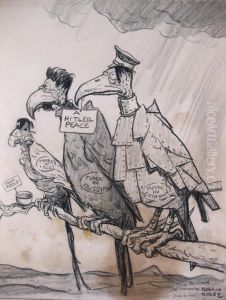Rollin Kirby Paintings
Rollin Kirby was an influential American political cartoonist born in Galva, Illinois, on September 4, 1875. He is best known for being one of the earliest and most celebrated political cartoonists in the United States and for being the first to receive the Pulitzer Prize for Editorial Cartooning, an award he won three times over the course of his career.
Kirby began his artistic journey at a young age, showing an interest in drawing and painting. He pursued formal education in art at the Art Students League of New York. However, it wasn't until he became a reporter for the New York Mail and Express that he started to combine his artistic skills with journalism. His transition to editorial cartooning was further solidified when he joined the New York World, which was then published by Joseph Pulitzer.
Throughout his career, Kirby's work was characterized by a sharp wit and a strong sense of social justice. His cartoons often addressed the pressing issues of his time, including women's suffrage, labor rights, the rise of fascism, and the policies of various U.S. presidents. Kirby had a distinctive style that was both bold and simple, allowing his messages to be conveyed with clarity and impact.
His first Pulitzer Prize came in 1922 for his cartoon 'On the Road to Moscow,' which criticized the Red Scare that was prevalent in the United States at the time. He won again in 1925 for a cartoon on the American peace movement and in 1929 for his commentary on Prohibition. Kirby continued to work as a political cartoonist until his retirement in 1951.
Rollin Kirby passed away on May 8, 1952, in New York City. His legacy lives on in the world of political cartooning, where his pioneering work set a high standard for the power of visual satire and commentary in the American press. Kirby's ability to distill complex political and social issues into single, compelling images has made him an important figure in the history of American journalism and art.
